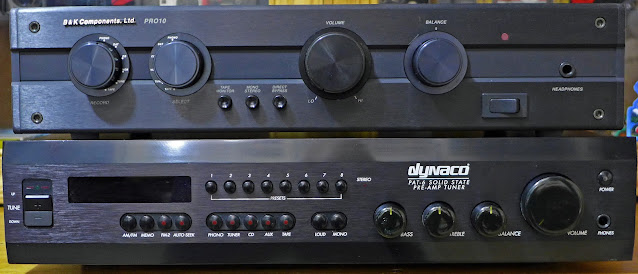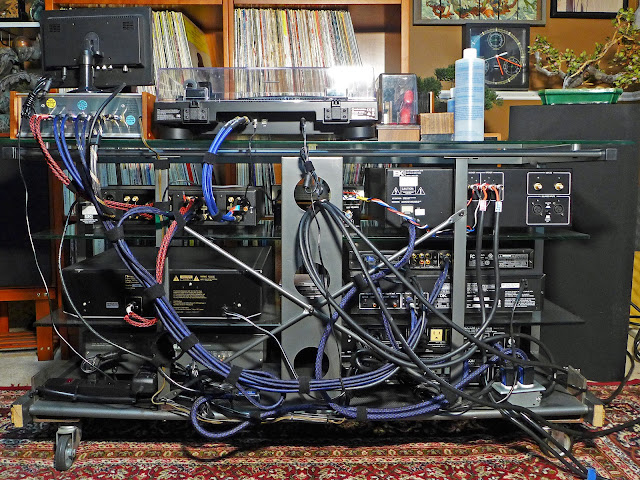October 17, 2024
#499
Gentle reader,
The OCD part of my brain does not like all those different sized components on the left. The turntable is off center too. Here is what it looked like for many years:
Yeah, that looks better. Due to the short length of the Liberty Cables, my new A-T turntable had to be off center so that they would reach the Phono inputs of the PAT-6. More on that below. It does not look a lot better, but at least the power amp matched the preamp in size. The device on top of the power amp is a double muffin fan which pulled the heat out of it.
A quick review: I've been enjoying this hobby since 1976 after seeing/hearing my new friend's stereo in 1975, which blew my mind with the SIZE of his homemade speakers which had 18" woofers and his expensive stereo components including a REVOX 10 1/2" reel-to-reel tape recorder. Suddenly the plastic "suitcase stereo" I thought sounded fine up until then, depressed me.
This book, which was advertised in Stereo Review magazine in 1975, and it is quite a large book, (note LPs behind it) in which the author, Mark Tobak, reviewed all kinds of components and speakers, which helped me decide which components and speakers to buy.
I built a Dynaco PAT-5 preamplifier kit (middle of the stack, set up for the photo) and two SWTPC Tiger .01 60 watt mono amplifier kits (long dead and gone). I bought a pair of "floor sample" Dynaco A25 speakers and a B.I.C 940 turntable. Over the years, I bought, via eBay: Dynaco Power amplifiers: ST-120, ST150 and at last, the top dog, ST-400 shown above. All three long gone as well.
Fast forward to 2024, thanks to thrift stores and eBay, I have been able to enjoy hundreds of components and speakers. An ad for The New Dynaco company in Stereo Review in the 1990's caught my eye. I wrote to them (an actual paper letter, sent by US Mail) and they sent me all these brochures. This was LONG before PCs, scanners, internet access and such existed.
Yes, even new TUBE equipment! Sadly, all that I could afford was their QD-1 Five Channel Home Theater System."SERIES II" in the name refers to it being a modernization of the 1970's Dynaco QD-1 Dynaquad (below). Their answer to the then new Quadrophonic LP records and various decoders each type required. The Panor/Dynaco's top solid state power amp is the ST-400 SERIES II. Which I never could afford. I chose the ST-200 when I saw one on eBay because it would more than supply me with enough output AND it had terminals for TWO sets of speakers. It's big brother, only one pair.
Photo courtesy of TMR Audio.
Back to 2024. My Dynaco ST-200's left channel stopped working. Since there is ZERO information/service manuals on the Internet from the vanished PANOR company. I was suddenly in need of a new power amplifier which I fully covered in the previous article linked above.

Since components from the same company should work well with each other, and that the Dynaco PAT-6 was also thirty years old, I began looking for a B&K preamplifier on eBay. There were several listed, but the ONE PRO10 Sonata which included the power supply was the one I wanted. Twenty-three other people were watching it, and I joined the list.
I waited until the day before the buy-it-now sale ended, I took a deep breath and clicked Buy-It-Now.
And here it is! Shipped in the original box. How rare that is!
Whenever I get a new piece of equipment, I compare the two in my blog.B&K Components, was an American company, as were both Dynaco companies. The original Dynaco built their equipment (but not their speakers) in the USA. As did B&K Components, sadly, that company, like both Dynaco companies, no longer exist. Panor-era Dynaco's equipment were built in Taiwan. I was recently informed by my reader and good friend, Bob Berne, that a web site all about the original Dynaco which I linked in an article years ago no longer exists. So sad. As well, the Panor/Dynaco web site and B&K Components web sites are also gone.
On the left, the DIN socket in which the elusive power supply cable plugs. The two black XLR sockets for "Balanced" cables sockets wait to be inserted and put to use.
All of the RCA terminals are gold plated, well marked and well spaced.VCR dates the unit. I actually found a DAT one day in a thrift store once.Phono Ground knob/nut is easy to reach and grasp compared to the PAT-6's. A look inside. Quality, to say the least!Below, literally, dates the component.And now a look inside the made-in-Taiwan Dynaco PAT-6 preamplifier/tuner.
Sparse, isn't it?Lots of empty holes for components not needed. What else used this PCB?Okay, now that the external and internal look at the two of them, let me show you the hidden, DARK SIDE of my stereo system.
Above is the cable's arrangement with the Dynaco PAT-6 and the B&K ST1400. See why the turntable is so off center? I use various brand high quality RCA interconnect cables. The dbx II complicates things, but, if you have never heard a dbx encoded LP, you are missing out! The main interconnect cables (long and blue) are Monster Cable's top-of-the-line interconnects. Their model name, I no longer recall. The thicker and also blue, cables are PANGEA IEC AC power cables. At this juncture, I was using RCA cables to the B&K power amp's inputs. Another factor in my seeking the B&K preamp which also uses XLR cables. Something I have never experienced.
And, this is the first set up with both B&K components in the same location as the previous Dynaco pieces. The XLR cables had not yet arrived.
I chose WBC (World's Best Cables) XLR cables. I thought three foot long ones would be sufficient. I was incorrect. Not wanting to return them and buy longer ones, I rethought how I wanted to do this. Remembering that the speakers are to the left of the system, (right end, from the rear) I decided to move the Radio Shack APM-300 and Dynaco QD-2 all the way to that end. This placed the ST1400 power amplifier in line with the central metal panel. This panel is not structural. Hmm, what to do with the speaker terminals, one being hidden. The white electrical tape I wrapped around both sides turned out to not be needed.
Fortunately, the bare wire-holes through the amp's thee-way binding posts are large enough to accept my Nakamichi speaker cable "banana" plugs. One warning, if you use these Nakamichi banana plugs, their "barrels" are all-metal, not plastic and thus ARE conductive. Do not unplug or plug or otherwise connect or disconnect speaker cables when the amplifier is powered on!
And now, a look at all the cabling of the Dark Side. Top right, is the Radio Shack APM-300 audio power meter with the Dynaco QD-2 above it. Open terminals on the left side of the latter are for the rear speaker cables.
A view from the front/top of both of them.Above and below is the uber-rare B&K Components PRO-10 preamplifier's Power Supply. It is centered and on the bottom shelf. As previously mentioned, I use PANGEA AC-14 IEC power cables whenever a component has a separate power cord.
Below is the rear of the two Adcom ACE-515 power conditioners. The black curved cable plugged into the top ACE is made from Belkin shielded three conductor power cabling. Plugged into the power box I made, are the cables for the OPPO DV-980H universal player and the other goes to the B&K preamp's power supply. The cable for the B&K Power Amplifier is plugged directly into the outlet labeled Power Amplifier of the top ACE-515. That circuit comes on ten seconds after all the other switched outlets to prevent any audio surges from reaching the power amp, possibly causing speaker damaging power surges.
Rear view of the OPPO and TDK CD recorder. HDMI cable (curled) connects to the 7 inch monitor atop the dbx II component. It is needed when playing SACD or DVD-Audio discs. One has to chose stereo or five channel audio output.
The power supply DIN cable and WBC XLR cables in their new home.
I had not heard of WBC until looking for XLR cables. They have super L-O-W prices, extremely low, compared to the majority of "high end" cable makers!
By the way, I do not make ANY money from this blog. It is a labor of love. The fact that so many people actually read and enjoy my writing is why I write.
As pointed out above, the RCA terminals are well spaced and have easily read labeling the two pairs of RCA preamp outputs are not needed with XLR cables.
With all of the inputs the B&K PRO-10 preamplifier has, I no longer need the SONY A/V switch I had used (atop) the PAT-6. Thus, a reduced the number of RCA cables overall.
First of all, THANK YOU for sticking all the way to the end of this article! I believe that I can now center the turntable!
I realized just now that I had not tried a cassette tape with the PRO-10! One thing the B&K lacks is Tone Controls. So far, the two B&K combined components make the sound I was used to with the Dynaco pair PALE by comparison! I'm 68, so high frequencies elude my ears, thus, I always rotated the Treble control to the right.
Just now, I pushed the Tape Monitor button and there was audible hiss as the tape rolled past the clear leader, then much more hiss (I have NEVER heard this before) so, I pressed the Dolby button. The his receded. Then the music came on. My deck is a three-head JVC KD-V6 and has always sounded good. But, through the B&K Brothers, WOW! Okay, time to enjoy my new system before my wife gets home!
The Listening Room in October, 2024. May it remain the same for many years to come!
Thank you SO much for reading my blog! Feel free to comment below or via Facebook.
Scott Robb
October 17, 2024
#499

















































